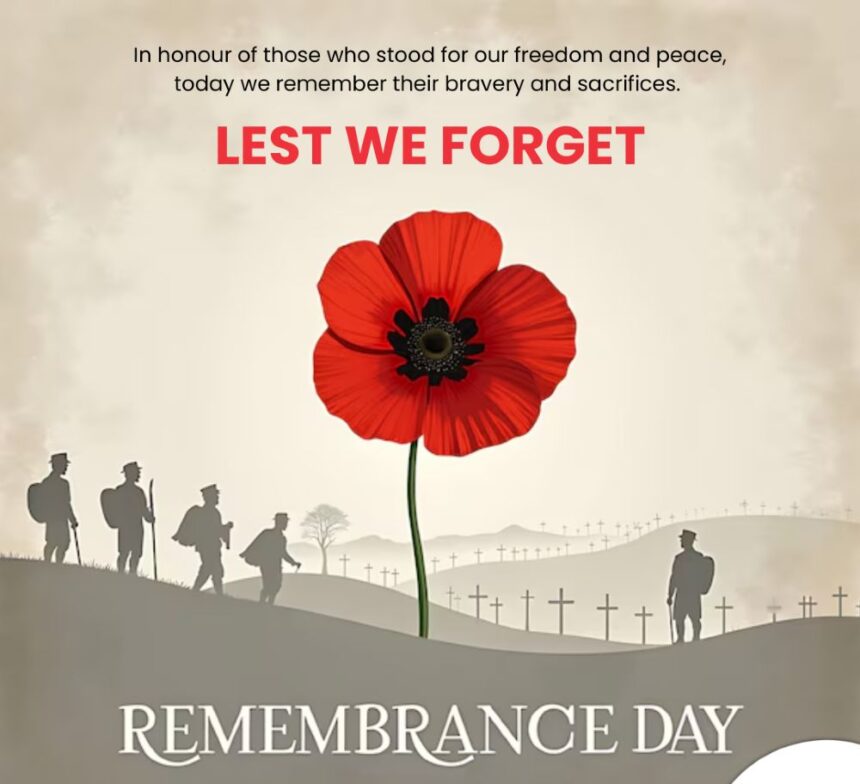🕯️ Moving Truths About Remembrance Day That Inspire Lasting Peace and Honor
🕊️ Introduction: Why We Must Never Forget
Remembrance Day is more than a date on the calendar — it’s a collective memory, a solemn tribute, and a timeless reminder of the cost of freedom. Celebrated primarily on November 11th, it is a day when nations pause, remember, and honour those who sacrificed their lives in war and peacekeeping missions.
- 🕊️ Introduction: Why We Must Never Forget
- 📜 History of Remembrance Day
- 🧠 Important Facts About Remembrance Day
- 📆 Timeline of Remembrance Day
- 🙋♀️ Frequently Asked Questions (FAQs)
- 🌍 Significance of Remembrance Day
- 1. Historical Reflection
- 2. Honouring Sacrifice
- 3. Promoting Peace
- 4. Unity Across Borders
- 5. Educating Youth
- 🎖️ Observance & Traditions
- 💬 Wishing and Expressing Gratitude on Remembrance Day
- 🧠 Why It’s Important in Our Lives
- ✔️ Builds Gratitude
- ✔️ Strengthens Values
- ✔️ Promotes Peaceful Thinking
- ✔️ Connects Generations
- ✔️ Inspires Social Service
- 🧩 Conclusion: Why We Must Continue to Remember
- 📌 Key Takeaways
While often associated with parades and poppies, the real power of Remembrance Day lies in its emotional and moral gravity. It urges us to reflect not only on the soldiers of the past but also on the value of peace in the present. Let’s explore this day in depth, including its history, facts, timeline, FAQs, significance, observances, and its impact on our personal and societal lives.
📜 History of Remembrance Day
Remembrance Day originated after the end of World War I — one of the deadliest conflicts in human history. The armistice (truce) that ended hostilities was signed at 11 a.m. on November 11, 1918. This moment — “the eleventh hour of the eleventh day of the eleventh month” — became a global symbol of peace and mourning.
In 1919, King George V inaugurated the first Armistice Day in the UK and Commonwealth. Over time, as wars continued, the day was renamed Remembrance Day to honour all who died in military service — including those in World War II, Korea, Afghanistan, and peacekeeping efforts around the globe.
🧠 Important Facts About Remembrance Day
Here are some key facts that deepen our understanding:
Symbol of the Poppy: Inspired by the poem In Flanders Fields, red poppies are worn as symbols of remembrance and hope.
Observed Globally: Known as Veterans Day in the USA and Armistice Day in France/Belgium.
Moment of Silence: At 11:00 a.m., a two-minute silence is observed worldwide.
Commonwealth Observance: It’s a national holiday in countries like Canada, UK, Australia, and New Zealand.
Cenotaph Ceremonies: Public tributes take place at cenotaphs (empty tombs) to honour the fallen.
White Poppies: These are worn by some to symbolize peace without glorifying war.
The Royal Family: In the UK, members of the British Royal Family participate in Remembrance Sunday events.
📆 Timeline of Remembrance Day
| Year | Milestone |
|---|---|
| 1918 | Armistice signed ending WWI |
| 1919 | First Armistice Day held |
| 1931 | Canada officially recognizes Nov 11 as Remembrance Day |
| 1945 | WWII ends, Remembrance Day expands in scope |
| 1956 | Official renaming to “Remembrance Day” in many countries |
| 1990s–2000s | Inclusion of peacekeepers and recent veterans |
| Present | Digital tributes and educational programs increase |
🙋♀️ Frequently Asked Questions (FAQs)
Q1. Why is Remembrance Day on November 11?
Because World War I ended on November 11, 1918, marking the armistice agreement between the Allies and Germany.
Q2. What is the significance of the poppy?
Poppies grew on the battlefields of Flanders, symbolizing life amidst destruction. They became a powerful emblem of remembrance.
Q3. Is Remembrance Day a public holiday?
Yes, in many Commonwealth countries like Canada, Australia, and the UK (as Remembrance Sunday), it is a public or partially recognized holiday.
Q4. Who do we remember on this day?
Soldiers who died in World Wars, recent wars, peacekeeping missions, and all who served in the armed forces.
Q5. How is it different from Veterans Day in the USA?
Veterans Day honours all veterans, living or dead. Remembrance Day primarily commemorates those who died in service.
🌍 Significance of Remembrance Day
Remembrance Day is not just about looking back — it’s about looking forward with wisdom. Its significance unfolds across several dimensions:
1. Historical Reflection
It helps us understand the gravity of war, the fragility of peace, and the resilience of the human spirit.
2. Honouring Sacrifice
It’s a moral obligation to remember those who laid down their lives, often in foreign lands, for causes bigger than themselves.
3. Promoting Peace
By remembering war, we are reminded of the importance of diplomacy, dialogue, and international cooperation.
4. Unity Across Borders
Whether in Canada, the UK, India, or Australia, people join together in a shared act of remembrance, transcending nationality.
5. Educating Youth
Schools and communities use this day to teach younger generations about sacrifice, courage, and the cost of silence in the face of evil.
🎖️ Observance & Traditions
Wearing Poppies: People wear red poppies on lapels to show respect.
Moments of Silence: Held at 11:00 a.m., especially in public institutions, schools, and gatherings.
Cenotaph Ceremonies: Wreaths are laid by families, politicians, and military personnel.
Church Services: Held to offer prayers and gratitude.
Remembrance Sunday (UK): A special service held on the Sunday closest to November 11.
Digital Tributes: Social media campaigns, virtual walls of remembrance, and online memorials.
Educational Programs: Documentaries, school assemblies, and veteran talks are common.
💬 Wishing and Expressing Gratitude on Remembrance Day
Even though this is a solemn occasion, words of appreciation and remembrance matter deeply. Here are a few human-friendly ways to honour the day:
“Lest we forget — your sacrifice lives in our freedom.”
“Today we bow our heads in gratitude, not in sorrow.”
“Thank you for the peace you gave us through your courage.”
“We remember so we never repeat.”
“Gone, but never forgotten. Always honoured.”
You may also share a poppy image or support a veteran organization to go beyond words.
🧠 Why It’s Important in Our Lives
Despite being about past wars, Remembrance Day resonates in our modern daily lives in surprising ways:
✔️ Builds Gratitude
In a world driven by materialism, it grounds us in emotional and historical perspective.
✔️ Strengthens Values
Courage, sacrifice, and patriotism become more than just textbook words — they become personal.
✔️ Promotes Peaceful Thinking
It challenges us to resolve conflicts peacefully in our own lives — be it in families, workplaces, or communities.
✔️ Connects Generations
By engaging with the stories of our grandparents or great-grandparents, we build emotional bridges across time.
✔️ Inspires Social Service
Many are motivated to volunteer, donate, or support mental health initiatives for veterans.
🧩 Conclusion: Why We Must Continue to Remember
In an age of short attention spans and fast-changing news cycles, Remembrance Day offers a rare pause — a timeless moment of reflection. It connects us to our past, challenges our present, and guides our future.
It is a reminder that peace is never free. It has always come at a cost. And those who paid it did so for us to live in a world that values freedom, dignity, and humanity.
Let us honour them — not just with silence, but with a life lived meaningfully.
📌 Key Takeaways
📅 Date: November 11
🏅 Origin: After WWI armistice in 1918
🧠 Symbol: Red poppy
⏱️ Tradition: Two-minute silence at 11 a.m.
🌐 Global Impact: Observed in Commonwealth and beyond
🕯️ Purpose: Honour fallen soldiers, promote peace, and reflect on freedom
🤝 Relevance Today: Inspires unity, gratitude, and a peaceful mindset









Thanks for the auspicious writeup. It in reality was once a leisure account it. Look complicated to far delivered agreeable from you! However, how can we communicate?